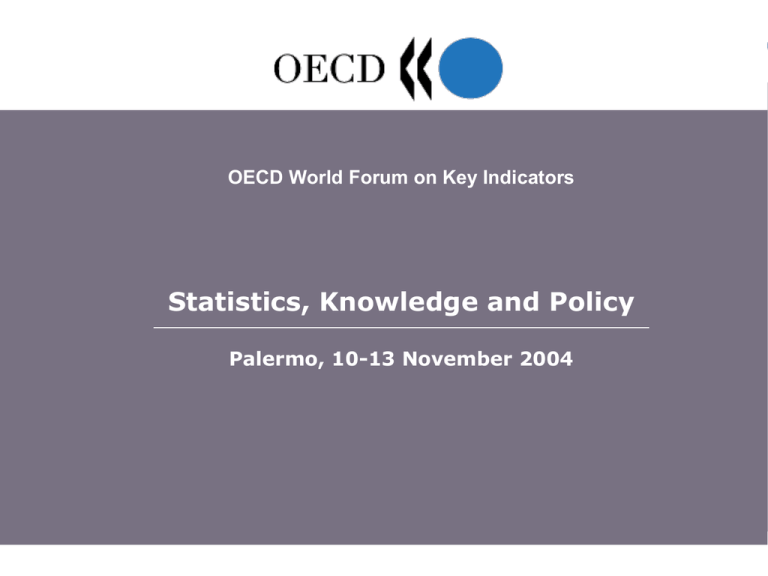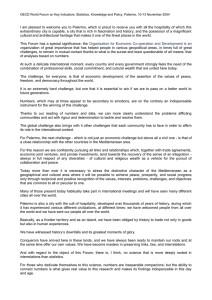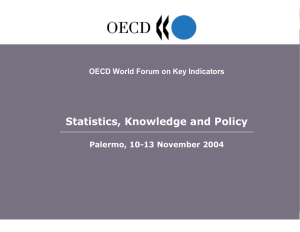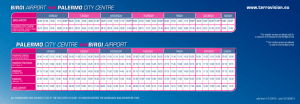Statistics, Knowledge and Policy
advertisement

OECD World Forum onon Key Indicators OECD World Forum Key Indicators Statistics, Statistics,Knowledge Knowledgeand andPolicy Policy Palermo, 10-13 November 2004 Palermo, 10-13 November 2004 OECD World Forum “Statistics, Knowledge and Policy”, Palermo, 10-13 November 2004 1 Towards an Atlas of Social Capital and Institutions in Italy: Strategy, Developments and Open Issues Alessandra Righi Istat OECD World Forum “Statistics, Knowledge and Policy”, Palermo, 10-13 November 2004 2 Interest in Social Capital • The concept is increasingly used at local policy level (Institutions, Social Networks, Territorial pacts, Business incubators) • It is a common ground for Sociology, Political Science and Economics and it seems possible a converging collaboration using simplifying models • Research results show that SC can explain differences in productive organisation, in economic development and inequities in social life OECD World Forum “Statistics, Knowledge and Policy”, Palermo, 10-13 November 2004 3 Istat Social Capital Project • Given the large scientific interest and the growing pressure exercised by national and international organisations and although there are different national studies and measurement of SC at local level, we decided to make a SC project with the following characteristics: reproducibility, quality, reliability • We proposed an Atlas of Local Development through information on the presence of Institutions, the availability of infrastructures, the quality of life, the awareness of Social Capital OECD World Forum “Statistics, Knowledge and Policy”, Palermo, 10-13 November 2004 4 Key element of the Project • Analysis of presence/absence of Institutions and Social Networks and their interactions with Local Development Moreover, we want to analyse the interactions among these three variables Use the potential of a GIS to choose the better territorial aggregation of local areas for a better understanding OECD World Forum “Statistics, Knowledge and Policy”, Palermo, 10-13 November 2004 5 Developments of the Project • • • • • • • • Creating a research network Finding data sources Proposing a working definition Defining dimensions, themes and indicators Analysing the information needs Choosing the territorial level of analysis Defining measurement process Choosing the forms of dissemination OECD World Forum “Statistics, Knowledge and Policy”, Palermo, 10-13 November 2004 6 Matrix of Sources SURVEY Aspects of daily life Family, social subjects and childhood condition Health conditions and use of health services Leisure time and culture 1995 Citizens and leisure time 2000 Citizens’ safety Time Use ECHP Labour Force Quarterly Survey Labour Force Continue Survey Household Budget Survey Household Budget Survey - Quest. On Life cond. School to work transitions of upper secondary school graduates Survey School to work transitions of university graduates (long degree) Survey School to work transitions of university graduates (short degree) Survey Administrative Sources (Pop. Census, No profit institutions Census) OECD World Forum “Statistics, Knowledge and Policy”, Palermo, 10-13 November 2004 Observed Period 1993 - 2002 1988 (2003) 1994, 2000 1995 2000 1997/1998 2002 1994 -2000 2003 2003 2002 2002 1995 1995 1996 Various Years 7 Questions databank Main dimensions of S.C. Other dimensions of Atlas 1) Social participation 2) Civic participation 1) Human Capital 3) Social networks, support 4) Trust, reciprocity 2) Social/economic Integration 5) Control and self-efficacy 3) Communications 4) Institutions and private 6) Perception of social economic sector struct. and public services OECD World Forum “Statistics, Knowledge and Policy”, Palermo, 10-13 November 2004 8 Tab. 2 – Matrix of main dimension and themes of social capital in Istat surveys and administrative sources Surveys Family, social subjects and childhood condition Aspects of daily life Participation in groups Participation, Formal Volunteering Social engagement Religious practice Voting Political participation Civic participation Funding Parental, neighbour and Social friend networks interactions, social Receipt of unpaid help networks and supports Provision of unpaid help Trust in other people and in public services Perceived fairness of life, discrimination Positive attitudes toward Trust, the future reciprocity, social values Perception of social values Control and self-efficacy Subjective aspects Perception of social structures and Quality of public services public services and of local area Administrative source Health conditio ns and use of Leisure Citizen Time Survey health time and s’ services culture safety Use ECHP HBS on Birth School to work transitions (upper No profit sec.& institutions univ.grad.) Census Volunteerig Organization Survey Admin. source 10 4 - 2 - 2 2 - - - - - - 10 1 6 9 1 6 1 - 1 - 1 8 - - 6 5 - 1 1 - - - - 7 - 1 - 6 - 13 32 2 23 2 16 4 - - 1 - - - - 13 3 - - 4 2 10 - - - - 1 4 - - - 3 3 - - - - - 1 9 1 - - 4 - - - - - - - - 1 - - - - - - - - - - - - 1 - - - - - 1 - - - - - - 2 1 - - - - 7 - - - - - - 10 4 10 3 - 11 12 1 4 1 6 - - 35 3 - - 30 - - 2 4 - - - - Outlines • Two groups of themes: 1) those with many questions in one single survey that do not allow for a wide comparison on several sources 2) those with few questions for each survey for which it is possible a comparison • More than 60 sub-themes identified • The greatest gaps in “Reciprocity and Trust” • Surveys give result at regional level. To increase territorial detail we could acting ex-post on weights OECD World Forum “Statistics, Knowledge and Policy”, Palermo, 10-13 November 2004 10 Matrix enables • to select questions that provide the best results and to add them in SC ad hoc modules of the “GHS” • comparisons in a national and international contest, to better understand the differences in question wording that could lead to differences in comparing the results OECD World Forum “Statistics, Knowledge and Policy”, Palermo, 10-13 November 2004 11 Open Issues • The SC matrix, with the gathering in a database of about 400 questions, has been a necessary effort for starting with a clear definition and measurement path • The use of this tool will be complete when quantitative information relative to each questions or indicator will be available OECD World Forum “Statistics, Knowledge and Policy”, Palermo, 10-13 November 2004 12 Open Issues • Which is the best measuring approach in statistical terms? • Are we able to choose the best territorial aggregation offered by GIS in order to understand the interactions among Institution, SC and Local Development? • Are we able to best use explanatory potentials of different indicators for different local areas? OECD World Forum “Statistics, Knowledge and Policy”, Palermo, 10-13 November 2004 13 Relevance of an International network • Some countries have already developed different steps in these studies. Some NSIs faced the same problems and frequently they synthetize their experiences with guidelines • For a newly come NSI it is difficult to decide which is the best strategy of approach • To discuss these guidelines can contribute to choose the direction to follow OECD World Forum “Statistics, Knowledge and Policy”, Palermo, 10-13 November 2004 14 Relevance of an International network • Many choices at any step of the project : definition, methods, questions, ad hoc module, questionnaire (dimension and periodicity) • An international permanent group can support members in problem solving • In SC studies OECD and Siena Group have already been an important international role to create harmonised measurements OECD World Forum “Statistics, Knowledge and Policy”, Palermo, 10-13 November 2004 15 International measurement • It is difficult to say at what extent it is possible an internationally comparable measure of SC because of cross cultural differences in the meaning of some SC dimensions (i.e. Trust) • Many difficulties could be overcome introducing a larger subset of indicators: not only an indicator for each SC main dimensions, but combinations of different indicators in order to consider specificities: for different countries (Mediterranean, transition, etc.), for gender,... OECD World Forum “Statistics, Knowledge and Policy”, Palermo, 10-13 November 2004 16 International web forum on SC Like UNDP is doing for HDI with the HDRStatsNet, an international expert forum created to discuss issues related to measuring human development, including how to calculate the composite HD indexes, innovations in adapting these indexes to local contexts, measuring MDG progress, good methodological practices OECD World Forum “Statistics, Knowledge and Policy”, Palermo, 10-13 November 2004 17


